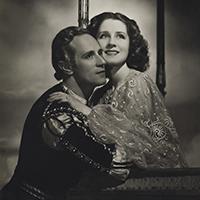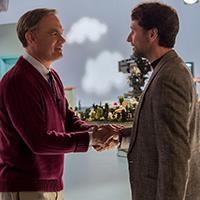TCM, 6:00 a.m. ET
Some of the most satisfying days in TCM’s annual “Summer Under the Stars” month come when they set aside 24 hours for a deep dive into some of the careers whose films have been less celebrated, or at least available, in recent decades. Today’s subject, Norma Shearer, certainly remains celebrated – the prime-time anchor of her salute today, 1939’s The Women, is an acknowledged and still widely repeated classic. But there are many of her movies that don’t often see the light of day, or the spotlight of a national TV schedule. So watch, today, for such relative rarities as her titular turn in 1938’s lavishly costumed Marie Antoinette (at 1:15 p.m. ET), and for 1937’s Romeo and Juliet, in which she stars opposite Leslie Howard (pictured). Considering she was 33 years old at the time the film was released, Shearer may have been a bit mature to play Shakespeare’s 13-year-old heroine – but Howard, her romantic lead, was 43. Perhaps such casting, at the time, was unavoidable: as Shakespeare himself observed, “Youth’s a stuff will not endure.” Sigh. Don’t I know it.

Starz!, 8:00 p.m. ET
I was really touched by this 2019 film, in which Tom Hanks plays children’s TV host Fred Rogers, and I recommend it highly. It’s based on one specific chunk of time in Rogers’ life, when he assented to be profiled for a 1998 Esquire magazine by writer Tom Junod. Matthew Rhys, whose Perry Mason HBO miniseries just wrapped for the season yesterday, plays the journalist – who, in this film, is renamed Lloyd Vogel, a fictional character. And therein lies my objection to this otherwise wonderful movie, which is written by Micah Fitzerman-Blue and Noah Harpster, and directed by Marielle Heller. Junod asked that the character based on him be given another name, because almost all the scenes in the movie involving the writer and his father (played by Chris Cooper) – the fight at the wedding, the conversations as the father became ill – were concocted by the screenwriters, and didn’t occur in real life. And my point, and I think Junod’s, is that the real, true, accurate story of what happened, to Junod and to Rogers, was more than dramatic enough to form the framework for a film. So when you watch A Beautiful Day in the Neighborhood, be aware that some of the emotional plot points are put there, and generated, by writers out to tug at your emotions. But be equally aware, and grateful, that when Hanks is embodying Fred Rogers, and reenacting scenes from the show that yank your heartstrings even more, that those feelings and reactions are the real deal. As, of course, was Fred Rogers. I profiled him, too, about 15 years before Junod did – for the Philadelphia Inquirer – and, like Junod, walked away with what turned into a touchingly resonant friendship.
